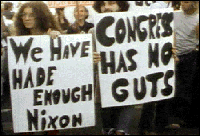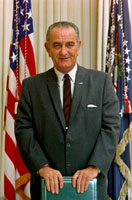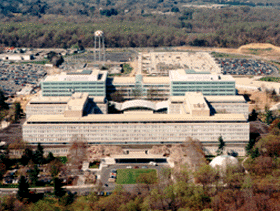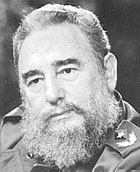|
● Racial Problems
● Poverty
● Drug Abuse
● Crime
● The Abuse of Power
by Government and Corporations
The Abuse of Power by Government and Corporations
 A
crucial problem of government and corporations concerns power-and
the abuse of it. American lives are dominated by large public and
private organizations. The public organizations, primarily government
agencies, affect almost every area of their experience. They register
births, provide education and social services, record our marriages,
regulate many of the conditions of employment, collect taxes, influence
countless aspects of lives through thousands of laws, and finally
register deaths. The private organizations, primarily business corporations,
provide jobs for the bulk
of the population and supply most of consumer needs, from banking
and television services to clothing and gasoline.
American lives and their entire complex civilization are largely
dependent on big organizations. Yet these A
crucial problem of government and corporations concerns power-and
the abuse of it. American lives are dominated by large public and
private organizations. The public organizations, primarily government
agencies, affect almost every area of their experience. They register
births, provide education and social services, record our marriages,
regulate many of the conditions of employment, collect taxes, influence
countless aspects of lives through thousands of laws, and finally
register deaths. The private organizations, primarily business corporations,
provide jobs for the bulk
of the population and supply most of consumer needs, from banking
and television services to clothing and gasoline.
American lives and their entire complex civilization are largely
dependent on big organizations. Yet these
 |
|
Mass Protest Against
the Watergate Scandal
|
organizations, originally established
to satisfy needs and improve the quality of lives, are often experienced
as oppressive, unresponsive, impersonal, inefficient, arrogant,
and even corrupt. Particularly since the Watergate scandal
of the early 1970s, it has been apparent that the major organizations
in American society sometimes work in
concert to advance
their own interests rather than those of the people. The lack of
public answerability
of these large organizations has become a major social problem.
 |
|
President Lyndon B.
Johnson
|
 Government
and corporations are widely distrusted in the United States. The
presidencies of Lyndon
Johnson and Richard Nixon were marked by a well-founded public belief that their
administrations were deliberately and systematically lying to the
people. Distrust of government reached its height during the Watergate
affair, when the discovery of the abuse of power drove a president
from office. Although
Nixon himself was pardoned
by his successor
and escaped accountability
for his acts in office, the Watergate affair led to the trials and
convictions of many high public officials on such charges as extortion,
perjury,
conspiracy,
subverting
the course of justice, misuse of campaign funds, bribery,
illegal wiretapping,
and tax fraud. Government
and corporations are widely distrusted in the United States. The
presidencies of Lyndon
Johnson and Richard Nixon were marked by a well-founded public belief that their
administrations were deliberately and systematically lying to the
people. Distrust of government reached its height during the Watergate
affair, when the discovery of the abuse of power drove a president
from office. Although
Nixon himself was pardoned
by his successor
and escaped accountability
for his acts in office, the Watergate affair led to the trials and
convictions of many high public officials on such charges as extortion,
perjury,
conspiracy,
subverting
the course of justice, misuse of campaign funds, bribery,
illegal wiretapping,
and tax fraud.
 |
|
The CIA Headquarter
in Maryland
|
 The
scandal provoked congressional investigations of the FBI and the
CIA that turned up literally thousands of illegal acts in
the executive branch of government. The
FBI, for example, was responsible for hundreds of burglaries of
presumed critics of the administration, and was guilty of widespread
illegal wiretapping. It had also deliberately attempted
to sabotage
the civil rights movement in the 1960s. The
CIA, whose charter specifically prohibits it from surveillance over
the domestic population, had infiltrated
the
civil rights and antiwar movements, compiled
dossiers
on
tens of thousands of Americans, and intercepted
and
read hundreds of thousands of private letters and telegrams.
It had also, without any authorization from Congress, plotted the
assassination of foreign The
scandal provoked congressional investigations of the FBI and the
CIA that turned up literally thousands of illegal acts in
the executive branch of government. The
FBI, for example, was responsible for hundreds of burglaries of
presumed critics of the administration, and was guilty of widespread
illegal wiretapping. It had also deliberately attempted
to sabotage
the civil rights movement in the 1960s. The
CIA, whose charter specifically prohibits it from surveillance over
the domestic population, had infiltrated
the
civil rights and antiwar movements, compiled
dossiers
on
tens of thousands of Americans, and intercepted
and
read hundreds of thousands of private letters and telegrams.
It had also, without any authorization from Congress, plotted the
assassination of foreign
 |
|
Fidel Castro
|
heads of state, including Fidel
Castro of Cuba. The
agency had also tested a variety of
drugs,
including LSD, on many people who were unaware that they were being
used as guinea
pigs, and
had caused several deaths in the process.
 As
for corporations, they are widely believed to be more concerned
with their own profits than with social responsibility, and the
quality or price of their products, or the truth of their advertising.
To further their interests, large corporations maintain professional
lobbyists in Washington, D.C. to influence public officials behind
the scenes. They argue for legislation to serve their own ends,
influence the appointment of officials, block reforms they consider
undesirable, and seem to have more say in the councils of government
than the ordinary voters. There are now more than 15 000 professional
lobbyists in Washington, representing a variety of economic and
other special-interest groups. One
poll showed that three out of five college students believe that
"big business has taken the reins of government away from Congress
and the Administration", and a national opinion
poll found that nearly 60% of Americans think that "government
is run by a few big interest groups looking after themselves." As
for corporations, they are widely believed to be more concerned
with their own profits than with social responsibility, and the
quality or price of their products, or the truth of their advertising.
To further their interests, large corporations maintain professional
lobbyists in Washington, D.C. to influence public officials behind
the scenes. They argue for legislation to serve their own ends,
influence the appointment of officials, block reforms they consider
undesirable, and seem to have more say in the councils of government
than the ordinary voters. There are now more than 15 000 professional
lobbyists in Washington, representing a variety of economic and
other special-interest groups. One
poll showed that three out of five college students believe that
"big business has taken the reins of government away from Congress
and the Administration", and a national opinion
poll found that nearly 60% of Americans think that "government
is run by a few big interest groups looking after themselves."
Previous Page Next
Page
|

